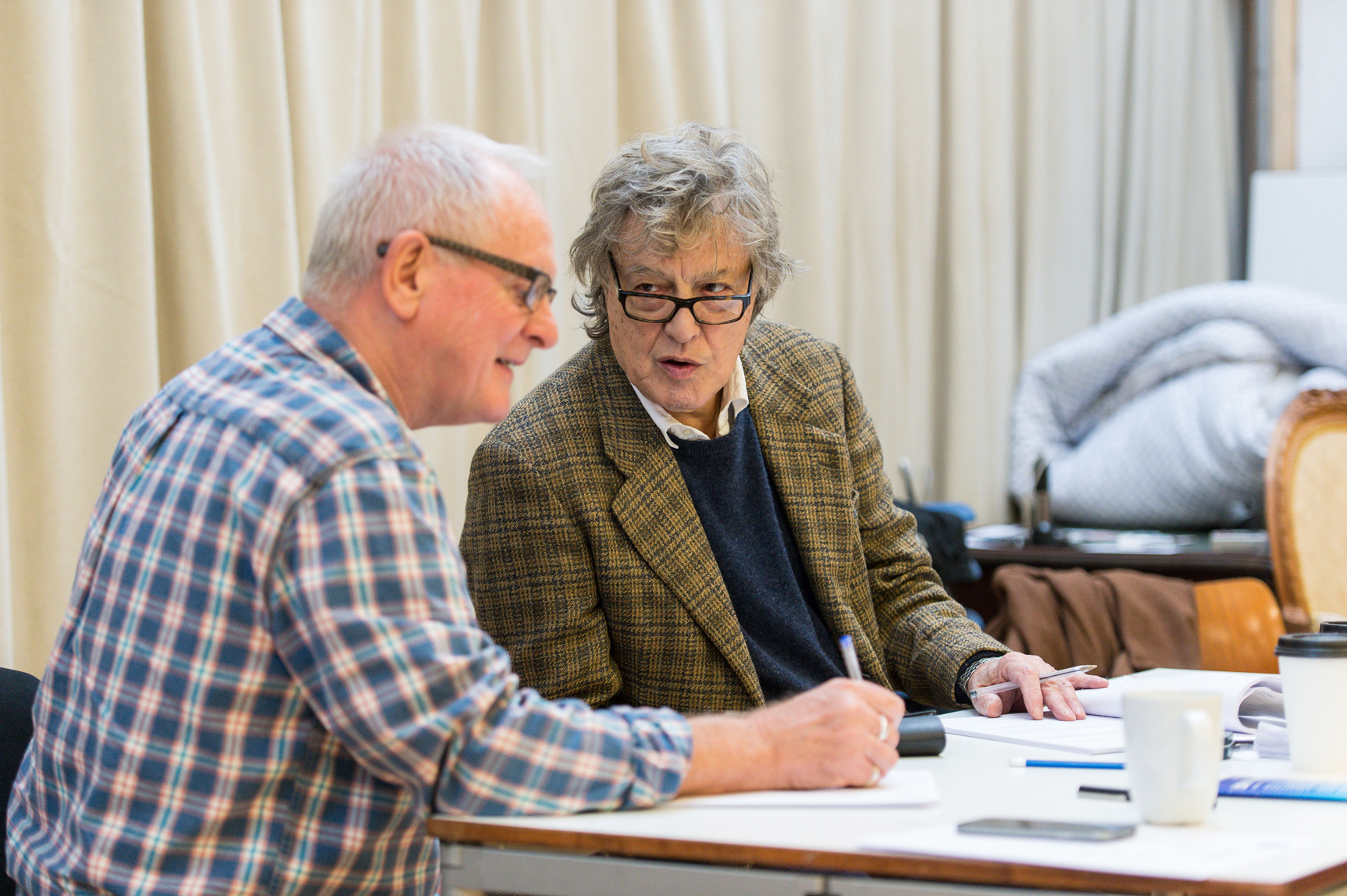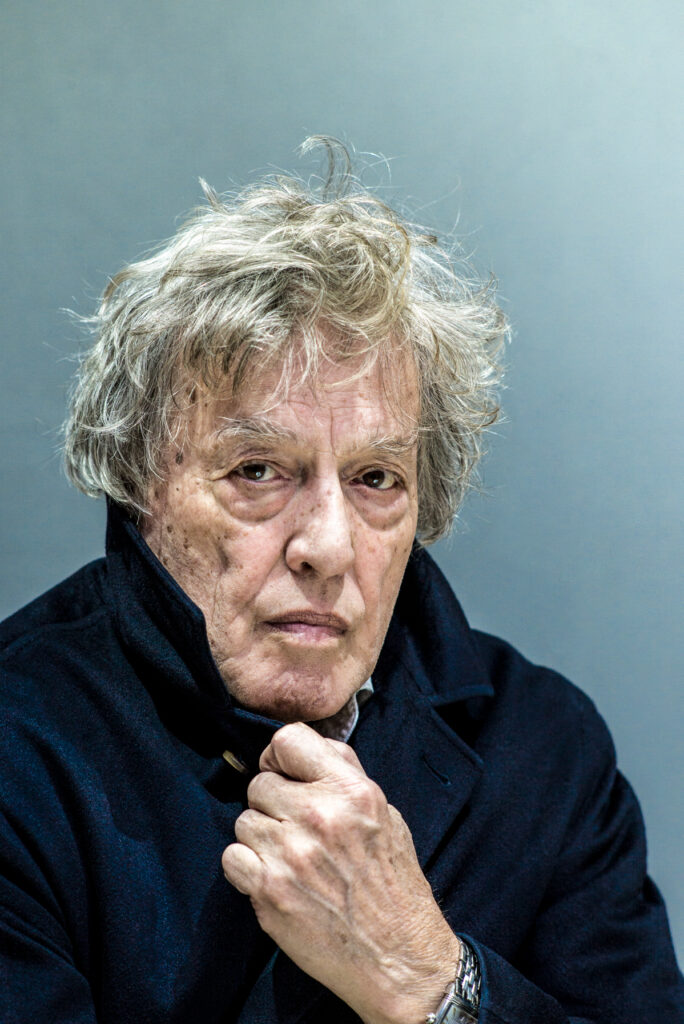Tom Stoppard on reviving Rock ‘n’ Roll and his future: ‘It feels like I haven’t stopped yet’
One of Britain's greatest living playwrights is back with a revival of 'Rock 'n' Roll', which sees classic songs being contrasted against the realities of life in the Eastern Bloc. He tells Rolling Stone UK about its return and why, at the age of 86, he isn't finished yet.
By Hannah Ewens

“I’m one of human nature’s fans, really. I could’ve been a groupie.” These are the words of 86-year-old Sir Tom Stoppard minutes after taking an afternoon cigarette break outside Hampstead Theatre. He is enthusiastically recounting the time the director Sir Michael Lindsay-Hogg introduced him to another knighted British gentleman of note, Sir Mick Jagger. Subsequently, Stoppard and Jagger became friendly, and in a full-circle moment The Rolling Stones frontman came to the 2006 opening night of Stoppard’s play Rock ’n’ Roll, which features music by The Rolling Stones. “By that time, I was going to see the band’s concerts with the precious access laminate,” Stoppard says with a proud grin.
It’s here at this theatre that Rock ’n’ Roll is to have its first major revival in the UK, at Stoppard’s suggestion and with his supervision. The plot is too amorphous and discursive to successfully recount in full but the decades-spanning political play, broken up with famous rock music songs as interludes, culminates with two characters going to a Rolling Stones concert in Prague in 1990. After most of the action consisting of sparring wordplay between Jan, a young Czech PhD student and rock music fan, who hates the repressive politics playing out in his home country, and his British Marxist professor, Max, who is a communist, this final scene is a welcome one of love, joy and the simple power of live music.
The last line of Rock ’n’ Roll is Esme exclaiming that she doesn’t care (“I don’t care. I don’t care.
I don’t care.”). It echoes a central concern of the play: whether or not music is genuinely political — and furthermore if musicians as figures of rebellion are actually political themselves or just want to be rock stars. In one off-hand scene, Jan explains why the police hate the Czech band The Plastic People of the Universe. It’s not because they oppose the official policy of the authoritarian state. What drives them crazy about the rock musicians is that they’re indifferent. “They’re not actually ideological, they just want to play their music and they don’t care about communism or anti-communism — they’re musicians, artists, pagans. The police resent them because they don’t care,” Stoppard explains, fully reclining on a sofa on an upper floor of the theatre, adding that, “This thing of ‘I don’t care, I don’t care.’ That is what every generation feels at a certain point.”
For Stoppard, music has been recreational and inspirational in his life, but not political. “I quite often have been listening only virtually to one track while writing a particular play,” he recalls. “I remember when I wrote a play called Arcadia, I was listening to [The Rolling Stones’] ‘You Can’t Always Get What You Want’. I played it and played it and played it. I don’t know why it was that one. It was like a drug, really.” Music matters, his work suggests, just maybe not in all the ways that we want it to.
He may not be a rock star but in many ways Stoppard, who became an overnight success during the swinging 60s, is the Mick Jagger of theatre. He doesn’t look dissimilar for starters. In the years that followed, Stoppard was pictured in editorials with a shag haircut, snappy style and cigarette in hand, his love life was a hot topic in certain literary and media circles, and he was swiftly known for being prolific and immensely talented. Today, he is still best described as Daphne Merkin once did in the New York Times, looking “like a lounge lizard who reads Flaubert”. His plays are never simple: they’re impressive displays of discourse, a literary fight between science and philosophy, with characters typically existing to be a conduit for ideas rather than as part of human dramas in their own right. The likes of Arcadia and Rosencrantz and Guildenstern Are Dead have been mainstays of A-level English courses, presumably picked for their brilliance in confusing teens across the country. Stoppard “matters”, Hermione Lee wrote in her 2020 biography of the man, “he will be remembered.”
Before writing for the stage, Stoppard was a freelance culture journalist, exchanging words for free nights out to plays and live music. One day, while he was working at a pop-culture title Scene Magazine, his colleague and future novelist Gordon Williams came into the office with black and white photographs of a little-known band called The Beatles. “It was like someone saying: ‘I have heard the future,’” Stoppard remembers. “Very shortly after that, one was listening to ‘Love Me Do’; before you knew where you were, it was ‘A Hard Day’s Night’ and ‘Help’. Before I knew where I was, I was married and listening to ‘Hey Jude’ in my own house outside London near Maidenhead where my wife worked, living a more suburban life.”
Despite his passion for music, Stoppard doesn’t have a musical ear and says he usually discovers music through personal recommendations. For instance, Pink Floyd — whose music is also played in Rock ’n’ Roll, and whose members are also now personal contacts of his — became one of his favourite bands after two of his sons continually played them at home when they were younger. “I’m always a bit embarrassed about me and music because I don’t have a musical brain,” Stoppard admits, adding that the speed with which people recognise what a particular song is on University Challenge baffles him. “It’s an odd one because you’d think that if you love something a lot, it will be because you understand what it is. Conversely, you might think if you get to understand something really well, it makes you love it. So, it’s a reciprocal thing, like a loop. But it’s not like that with me. I genuinely love the things I love but I couldn’t hum them, I don’t understand. If I’m actually watching music, I’m staring at the guitarist’s fingers trying to see what’s happening and I never can. Everybody’s got one thing that they wish they’d done, and for me, that’s what it is. Even going into a pub, and there’s somebody banging out music on an upright in a corner in a bar, I feel so envious of the ability to do that.”

Of all his plays, it feels culturally fitting that this one should get a revival in 2023. The vast majority of mainstream rock music over the past decade has been created for aesthetics and feeling rather than for any real engagement with politics and culture. There’s the fact that one of Rock ’n’ Roll’s themes is that of moral exhibitionism: posturing and demonstrating moral superiority has never been more prevalent than in a social media age. But Stoppard says this play is happening now simply because he wanted it to have another life. “Constantly what one gets is ‘Can you explain why this is still relevant?’ And I don’t give a toss about it being relevant,” he says casually. “It’s not the point for me. Theatre is recreational, it takes all kinds of stuff.” Yes, the play is about politics but it’s also about being human, eroticism, time, the poet Sappho, philosophy. Besides, Stoppard just really loves his play.
Like the character Jan, Stoppard was born in Czechoslovakia, escaping just before the Nazis, and came with his family to England. “The play hits a certain chord for me because it gathered up a lot of myself. My place of birth, my politics such as they were, my taste in music,” he says. Much of what happened as a result of this play moved him emotionally. For instance, when the play was in rehearsals in London originally, Stoppard invited The Plastic People to meet the acting company, and he got to be an acquaintance of the band once again. Then, when the play was put on in Czech and he went to Prague to watch it, the floor of the stage elevated and The Plastic People were playing underneath, which was, he says, one of the greatest moments of his life. Critics in the 2000s remarked that this was his most warm or human play yet — something that was a surprise to Stoppard too. “I’m quite a romantic,” he admits, “so I was quite pleased by the fact that I realised I’d got a love story going here. Because I don’t invent the play before I start, I just invent it as I go.”
He’s equally delighted that a play with 20 characters like Rock ’n’ Roll could work for a revival. “It’s quite expensive to do a play nowadays,” he says of this. “It’s a truism but it’s true enough that if you write plays that need a dozen people, quite complex sets, it gets more and more hard to find a place for a play — it’s to do with budget. I keep thinking I must write one of those other plays where you just put the lights on — two men in a basement.”
That future work is forever in his mind. Are there specific plays he wants to write during the rest of his life? “When I was young and healthy, I could do a play every four years, and I’ve been trying to get into a particular topic for about a year now. I keep waiting for things to get past me like this, so I can go back to it and get it moving and started properly,” he says with a sigh. “I’ve been very frustrated. So, the short answer is: I don’t have a play, although I’m old enough to retire. If you decide to retire, maybe you feel it doesn’t matter that ‘I don’t have a play’. But it doesn’t feel like that. It feels as though I haven’t stopped yet, so I hope I haven’t.” He’s been staying in London at his wife’s flat for the duration of the rehearsals for Rock ’n’ Roll. When the play opens in early December, Stoppard plans to return to Dorset and get back to his writer’s table, to quite literally put fountain pen to paper (he doesn’t own a computer). “There’s this wonderful Samuel Beckett line,” he says of his plan to try again at another play. “Fail better.”
As for his music fandom, he fits the typical mould of being a fan for life. “I kept my faith with The Rolling Stones right up to the present moment, and also with Pink Floyd. I was terribly thrilled to know these people — still am. But I feel that I’m now in nostalgia mode,” he says, and pauses knowingly before delivering his best line with a smile. “I’m not listening to Taylor Swift. Though I’m sure I’d probably love it if I did.”
